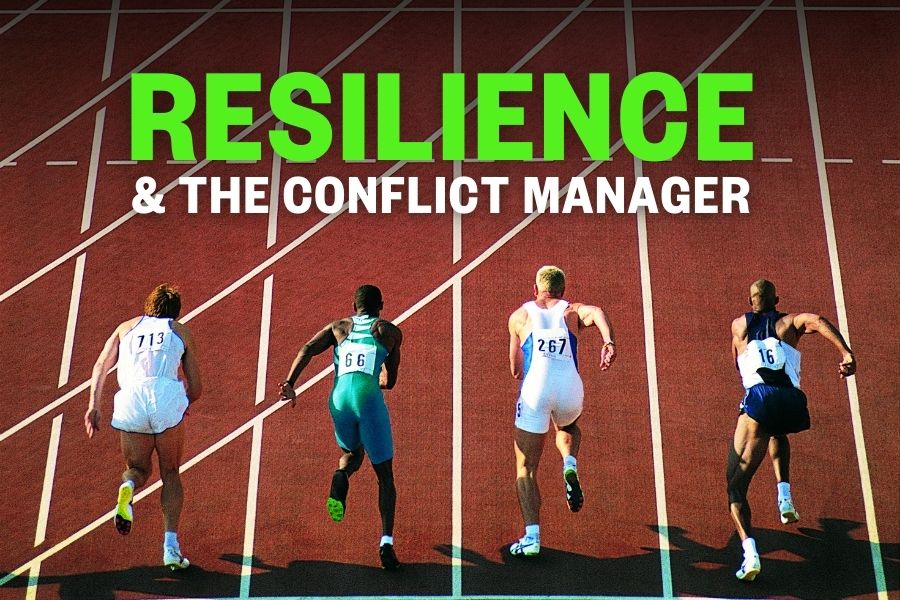Resilience & the Conflict Manager
October 16, 2024

Resilience is something that appeals to everyone.
For those who watched the Olympics, there were numerous athletes praised for their resilience in the face of injury, illness, personal tragedy, and defeat that it was difficult to keep track with all the resilient people in Paris!
Is there anyone who doesn’t want to become more resilient? Resilience is not a trait that comes immediately to mind when thinking of Conflict Management, though. While at first glance, the topic of building resilience does not appear to be an obvious component of a program in conflict management, but in reviewing the elements of resilience, the connection becomes clear. Many traits necessary for building resilience are the same traits needed by the individual managing crises, disputes, and conflicts.
A metaphor Dr. Jeff Thompson aptly uses is the reminder that airlines instruct passengers to secure their own oxygen masks prior to assisting others.
Being resilient is a strength that will benefit everyone. With all the joy, awe, and beauty that life offers, also present is conflict, crisis, and tragedy. Mediators, like anyone else, have lives outside of their professions and will encounter life events that can impact their mental health and wellbeing, which can intrude upon their professional practice. The techniques gained in the ICM619V: Developing Resilience in Conflict Disputes and Daily Stressors course, equip the dispute manager to provide their expertise in the service of others while maintaining their own mental fitness and enable them to bounce back from the traumas in their own personal lives. Resilience is a particularly critical skill for someone embroiled in conflict regularly, even if they are managing or mediating it. Emotional control is an important aspect of resilience building for conflict managers. Frequently, they are working with parties who have lost emotional control, and in those instances, it is easy for the manager to also get frustrated and lose emotional control, while being the most inopportune time to do so. The course also provides caution and skills in avoiding trauma and stress through the absorption of the suffering of others.
Specifically, elements of resilience such as calm, pausing, silence, and controlled breathing can aid the practitioner in supporting a person in crisis and provide the practitioner with the tools to better manage their own mental health. A calm conflict manager not only elicits confidence providing a professional demeanor that can act as a balm on the warring parties, but also aids in retaining personal emotional control. A gritty mediator will keep going when there appears to be no chance of a settlement. During a dispute, pausing for a break can be highly effective for all parties, including the mediator at reducing tension. Likewise, intentionally seeking a moment of silence in conflict enables a mediator to gather thoughts and provide the disputants space for reason to overcome emotions. Controlled breathing can be employed by practitioners for personal use or to help one in crisis achieve some semblance of calm.
It is also highly relevant that many key concepts and terms used in resilience, are skills and attributes used by professionals in dispute resolution, beyond ensuring their own emotional well-being. Empathy is a term that is used repeatedly in many ICM courses and is central to active listening, which is essential in conflict management. Professional conflict managers know that perspective is essential to managing a conflict and often rely on reframing to assist the parties in imagining alternative scenarios. Perspective shifting is a technique that conflict managers use to help parties gain a larger view, in addition to aiding the mediator in maintaining stronger mental resources. Mindfulness enables the practitioner to be aware of changes in demeanor among the conflicting parties.
Like so many other topics in the ICM program, resilience is not only a tool for the conflict manager, but a life skill and one that can be increased and improved upon over time. Much of life is out of our control, however we can choose how we respond to it and control our thoughts about it, and that is where resilience makes the difference.
Just like the Olympian athletes who bounce back after injury and defeat, conflict managers can utilize the same resilience skills to achieve their own success both personally and professionally.
Written by Kelly O’Connor, CFRE
Director of Development at Progress, Inc.
College of Leadership and Public Service News